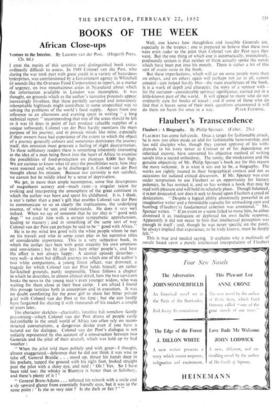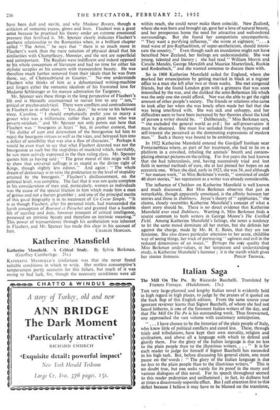Flaubert's Transcendence
Flaubert : A Biography. By Philip Spencer. (Faber. 25s.)
FLAUBERT has come full-circle. Once a target for fashionable attack, he is now too often made an idol for fashionable hero-worship, and has odd disciples who, though they cannot approve of his with- drawals to his ivory tower at Croisset or of his dependence on inherited income, have converted his objective method of writing novels into a sacred orthodoxy. The sanity, the moderation and the genuine objectivity of Mr. Philip Spencer's book are for this reason the more welcome. It is what it sets out to be, a biography. The works are rightly treated in their biographical context and not as occasions for isolated critical discussion. If Mr. Spencer was ever under temptation to use Flaubert as an opportunity for literary polemics, he has resisted it, and so has written a book that may be read with pleasure and will hold its scholarly place. Though balanced, it is not desiccated, nor does it seek to found upon Flaubert a creed of desiccation. " Despite a logical ability abnormally powerful in an imaginative writer and a formidable capacity. for unmasking cant and humbug (Flaubert's) fundamental criterion was emotional," Mr.
Spencer writes. Han event or a scene failed to move him, he either dismissed it as inadequate or deplored his own feeble response. Apparently it did not occur to him that intellectual perception was enough in itself ; and, though he was never specific on the point, he always implied that experience, to be truly known, must be deeply felt."
This is true and needed saying. It explains why a multitude of novels based upon a purely intellectual interpretation of Flaubert have been dull and sterile, and why Madame Bovary, though a criticism of romantic excess, glows and lives. Flaubert was a great artist because he practised his theory under an extreme emotional pressure that fertilised it. Mr. Spencer clearly indicates Flaubert's aesthetic relationship to the Romantics when, in a brilliant chapter called " The Artist," he says that " there is so much more in Flaubert's work than the mere notation of physical detail that his similarities with Champfleury, Monnier, and the rest are superficial and unimportant. The Realists were indifferent and indeed opposed to his whole conception of literature and had no time for either his stylistic scruples or his concern with transcendent beauty. He was therefore much further removed from their ideals than he was from those, say, of Chateaubriand or Gautier." No-one understands Flaubert who thinks of him as a dehumanised writing-machine and forgets either the romantic idealism of his frustrated love for Madame Schlesinger or his mature admiration for Turgenev.
Mr. Spencer sees these things in the long perspective of Flaubert's life and is blessedly unconcerned to recruit him to any " ism," critical or psycho-analytical. There were conflicts and contradictions in Flaubert as in other men. " Yes, dear," he wrote to his beloved niece, Caroline, " I should emphatically prefer you to marry a grocer who was a millionaire, rather than a great man who was poverty-stricken," and Mr. Spencer not only points out here that Flaubert was " bourgeois at heart " but, in another context, that "his dislike of cant and detestation of the bourgeoisie led him to reject the bourgeois virtues as well as the'vices, and betrayed him into a defect of sensibility that was also a flaw of character." Perhaps it would be even truer to say that what Flaubert detested was not the bourgeoisie as such but the stupidities of mankind which, inevitably, he saw most actively expressed in the then ruling class. Mr. Spencer quotes him as having said : " The great moral of this reign will be to show that universal suffrage is as stupid as the divine right of Kings, though slightly less odious." And again : " The whole dream of democracy is to raise the proletarian to the level of stupidity attained by the bourgeois." Flaubert's disillusionment, on the political level, was complete. The fact that it was not quite complete in his consideration of men and, particularly, women as individuals was the cause of the special friction in him which made him a man of genius and not a barren grumbler ; and one of the principal merits of this good biography is in its treatment of Un•Coeur Simple. "It is as though Flaubert, after his personal trials, had transcended the harsh conception of Bouvard et Pecuchet and granted that a humble life of sacrifice and duty, however innocent of critical intelligence, possessed an intrinsic beauty and therefore an intrinsic meaning." This power of transcendence through his aestheticism was inherent in Flaubert, and Mr. Spencer has made this clear in his account of



































 Previous page
Previous page